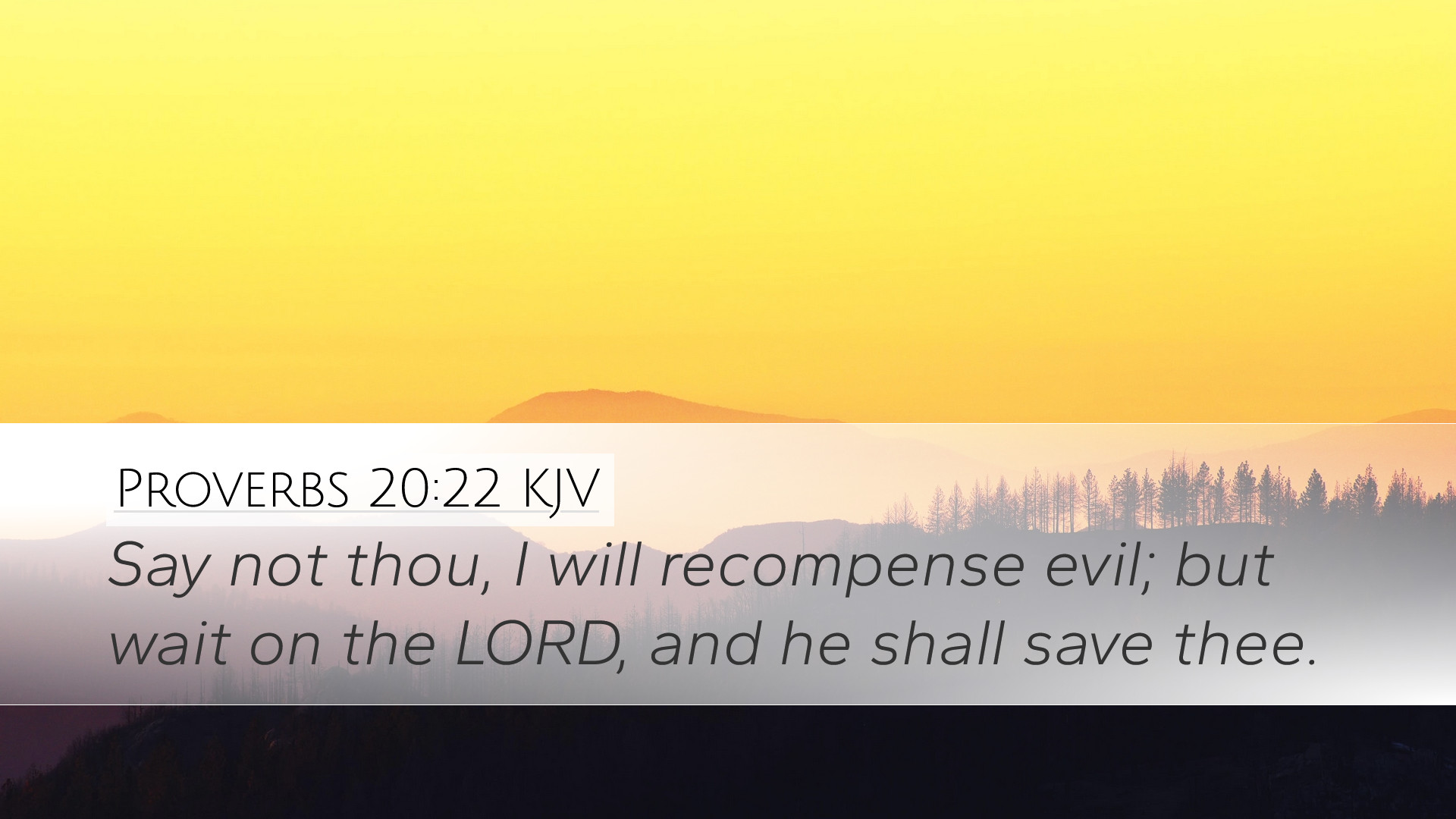Commentary on Proverbs 20:22
Proverbs 20:22 states: "Do not say, 'I will repay evil'; wait for the Lord, and he will deliver you." This verse encapsulates profound wisdom regarding the appropriate response to injustice, vengeance, and personal grievances. The insights from public domain commentaries such as those from Matthew Henry, Albert Barnes, and Adam Clarke shed light on its significance, implications, and applications.
Introduction
The context of this verse is critical. Proverbs is a collection of sayings that often provide moral guidance and practical wisdom for daily living. The particular focus of this verse addresses a common human instinct: the desire for retribution when wronged. This verse warns against the impulsive response of repaying evil with evil, urging the faithful to place their trust in divine justice.
Analysis of Key Phrases
- "Do not say": This opening admonition signifies a crucial internal dialogue. It hints at the need for self-control over one's speech and thoughts. The phrase suggests that before acting, one must evaluate their intentions and the implications of their words.
- "I will repay evil": This expression showcases the natural inclination to seek vengeance. Matthew Henry observes that it speaks to an inherent, often misguided desire for personal justice. True wisdom urges restraint in such situations.
- "Wait for the Lord": The call to wait implies trust in God's timing. Albert Barnes emphasizes that patience in the face of provocation demonstrates faith in God’s sovereignty. It encourages believers to recognize that human timelines and divine plans often do not align.
- "He will deliver you": Here, the assurance of deliverance restates the nature of God as a protector and avenger. Adam Clarke reflects on the notion that while immediate justice might not be evident, God’s ultimate justice will prevail, providing comfort and hope.
Theological Reflections
This verse speaks volumes about the character of God and the believer's relationship to Him. It implies a theocentric worldview where divine providence reigns supreme. The call to wait indicates a posture of hope and faith in God's justice, which stands in stark contrast to societal norms that often encourage self-advocacy at all costs.
Practical Applications
- For Pastors: This verse can serve as a valuable teaching point regarding the nature of forgiveness and mercy. Emphasizing that the act of waiting on the Lord can lead to deeper healing within congregants is essential.
- For Students: Understanding this principle can greatly enhance personal ethical decision-making, especially in scenarios involving conflict or perceived injustice in everyday life.
- For Theologians: The exploration of this verse can lead to a deeper understanding of divine justice versus human justice, touching on themes of retribution, grace, and mercy throughout Scripture.
- For Bible Scholars: Analyzing the historical and cultural context of this wisdom literature can provide insights into ancient Near Eastern attitudes toward vengeance and justice, enhancing exegesis.
Historical Context
The backdrop of Proverbs is instrumental in understanding its teachings. Written predominantly by Solomon, a king endowed with divine wisdom, these proverbs reflect an understanding of justice that is both practical and spiritually profound. In ancient Israel, the law permitted recompense (e.g., lex talionis or the law of retaliation). Yet, this proverb calls for a departure from that instinct towards reliance on God's just timing.
Reflections on Human Nature
Humans are naturally inclined towards vengeance. Matthew Henry notes that this desire often stems from pride and a sense of entitlement to justice. The call to refrain from such inclinations serves as a foundational principle for those seeking a godly life.
Conclusion
Proverbs 20:22 encapsulates a timeless truth relevant to believers across contexts. It invites an introspective glimpse into human behavior and encourages trust in divine intervention rather than human retaliation. By internalizing this wisdom, individuals can foster a life characterized by peace, patience, and ultimately profound faith in God's ultimate deliverance.


